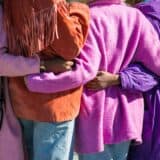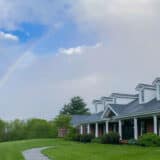The farm situated on the 40-acre rural property surrounding our emergency shelter offers the opportunity for survivors to heal in the fresh air while growing strong in body and mind.
Eating healthy food grown on the farm supports good physical health while healing from abuse. Quiet walks on the property offer moments to reflect and consider next steps. Children have space to ride bikes, climb trees, and explore nature. Adult survivors may choose to help on the farm in exchange for a weekly stipend. Harvesting produce and flowers and making products provides survivors with recent work history and new skills as they strive to rebuild their lives after abuse.
Farm programming is informed by research related to trauma-informed care for women veterans, studies exploring the restorative and healing outcomes of therapeutic gardens, and examinations of “social farming” to promote healing and inclusion in rural areas. The University of Kentucky Center for Research on Violence Against Women (CRVAW), with funding provided by the Department of Justice, recently completed a multiyear research project to determine the effectiveness of our farm-based programming. Report on the results of this research is forthcoming.
Read more about how therapeutic horticulture can help meet the complex needs of domestic violence survivors and their children in this article from the National Resource Center on Domestic Violence.
Our vision is for the farm to become a self-sustaining program that provides a reliable source of revenue for our agency while offering living wage employment opportunities for survivors. The integration of our farm with traditional services for survivors has received several national awards:
- Purple Ribbon Award for Program/Shelter of the Year (DomesticShelters.org)
- Celebrating Solutions Award (Mary Byron Project)
- Pyramid Award for Social Innovation (Center for Nonprofit Excellence)
- Innovative Nonprofit Award (Kentucky Nonprofit Network)
- Nonprofit Impact Award (Commerce Lexington)







